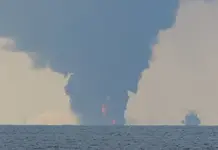May 4, 2010
The potential arrival of oil from the Deepwater Horizon oil spill in the Gulf of Mexico is likely to pose challenges for Florida's coastal wildlife. The Florida Fish and Wildlife Conservation Commission (FWC) is working closely with the Florida Department of Environmental Protection (DEP) and the Joint Information Center, which includes the U.S. Coast Guard and National Oceanic Atmospheric Administration as well as other federal and state agencies to monitor potential impacts of the oil spill on Florida.
The FWC is conducting pre-impact wildlife assessments, which include taking water samples and testing for contamination in sediments, fish and shellfish along Florida's coastline and into the Gulf of Mexico. The FWC also is evaluating critical habitat, shorebird and sea turtle nesting areas and other wildlife. These assessments will assist wildlife managers to determine potential impacts.
The FWC advises that coastal wildlife will be vulnerable to impacts from oil reaching beaches. Shorebirds and seabirds are in the middle of their nesting season, making them extremely vulnerable to disturbance. Nesting season for sea turtles is just beginning. Efforts to remove trash from the beaches before the oil arrives could be disruptive to nesting animals, and the FWC urges the public to follow specific guidelines.
The FWC has set up a Web page outlining appropriate actions to protect nesting shorebirds, sea birds and other vulnerable wildlife on Florida's beaches. The FWC is providing information to the Emergency Operations Center and DEP about wildlife areas that may be particularly vulnerable to impacts from oil spills. In addition the FWC has developed best management practices for avoiding impacts to Florida's endangered and threatened species.
The FWC and its partners have posted signs on many, but not all shorebird nesting areas. If birds in the area are acting agitated, calling or swooping at people, there is a good possibility it is a nesting area. The FWC asks the public and oil spill responders to retreat the way they approached and leave the nesting area.
Anyone involved in volunteer efforts to clear trash from the beaches should be particularly careful. Please keep the following in mind:
* Avoid working in areas where shorebirds are nesting; never enter or approach a posted shorebird area.
* When near nesting areas, stay below the high tide (wrack) line. Shorebirds nest on the open beach above this line. Nests are scrapes in the sand and the eggs are small and camouflaged. They easily can be crushed by pedestrians and vehicles.
* Remove only manmade trash. Seaweed and other natural debris are critical to shorebirds.
* Even though the wrack line is important to wildlife, if it becomes oiled it then becomes a death trap for birds and other wildlife and makes removal of oil from the beach more difficult. Timing for removal of beach wrack in oil spill response is critical. It should be left on the beach in areas of active nesting as long as possible but removed immediately prior to beaches becoming oiled. In areas distant from active nesting, cleanup of wrack and other natural debris can be performed to better facilitate future oil removal.
* On some Panhandle beaches, the FWC has installed short, white, PVC tubes in the dunes to track endangered beach mice, and on Perdido Key, small aluminum boxes also are being used. This important equipment should not be removed from the beach.
* Also, sea turtle nests are marked with stakes and orange tape - do not remove these items because they help protect the nests from disturbances.
* Do not place litter above the tide line; this can also interfere or cause harm to nesting birds.
* Do not use equipment such as rakes, shovels or tractors.
* Do not bring dogs onto the beach. Dogs, even when leashed, are very threatening to birds and cause them to panic.
Please report any nest disturbances to 888-404-FWCC (3922). To report sightings of oiled wildlife, call 866-557-1401.
To view this press release online visit
http://myfwc.com/NEWSROOM/10/statewide/News_10_X_OilSpill2.htm
You received this message because you subscribed for information about this topic from FWC Fish and Wildlife Research Institute. You may remove your e-mail from this list or view our privacy policy at
http://research.myfwc.com/subscriptions/.










